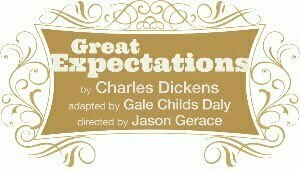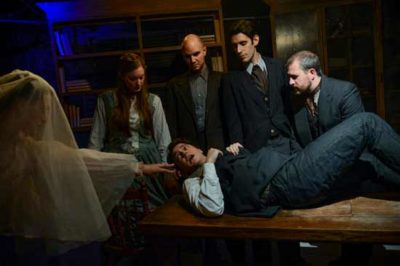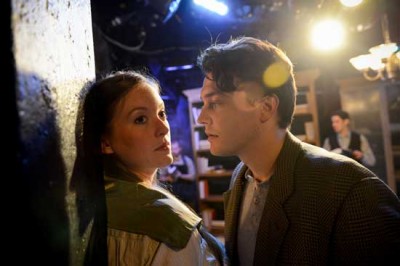Great Expectations
Directed by Jason Gerace
Produced by Strawdog Theatre Company
Round Two with Great Expectations
Strawdog has revived its crowd pleasing adaptation of Charles Dickens’s 1860-61 novel. Though the production wavers in tone, the story is told clearly and relatively concisely—considering the source—creating a production that should please fans of the perpetually popular novelist.
The story is told through six actors and a violinist. Mike Tepeli plays the hero Pip, while the other five alternate between multiple characters and a chorus of narrators. It’s a credit to Gerace’s direction, the actors’ skill and Brittany Dee Bodley’s simple but effective costumes that this is almost never confusing. Scene designer Joanna Iwanicka has kept the set minimal; a table doubles as a river, bookshelves become gates.
We are introduced to Pip, an orphan being raised by his tyrannical sister (Mary Winn Heider) and her blacksmith husband (Paige Smith). One day, the escaped convict Magwitch (Cody Proctor) demands Pip bring him food and tools. Pip does so, but Magwitch is caught anyway, and exonerates Pip. Some years later, the rich spinster shut-in Miss Havisham, who has worn her bridal gown for decades, invites him to play with her adopted daughter Estella (Amanda Drinkall). For reasons that have confounded people for 150 years, Pip falls in love with the heartless Estella, whom Miss Havisham has taught to hate all men in revenge for her own having been left at the altar. It seems bullying Pip was the real fun in inviting him, and Estella plants a deep insecurity in Pip’s mind about his common origins.
As a teenager, Pip works for his kindly brother-in-law Joe, and worries he will be a tradesmen his whole life. However, a lawyer named Jagger mysteriously invites him to London, where an unknown person Pip presumes to be Miss Havisham supplies him with enough money to live as a gentleman. His friend Herbert Pocket (Caleb Fullen) give him lessons on high society. Pip hopes to be able to marry Estella, but his expectations are complicated by rivals, continuing class difficulties, and the return of Magwitch.
The production tells the story so that a person unfamiliar with it will be able to follow every plot development. In that regard, it may be considered a success; however, there are still a few issues to be aware of when deciding whether you wish to see it. One is that the first half hour has a similar energy to that of the Reduced Shakespeare Company, with actors throwing books at each other and running around needlessly. But in the second act, the story is treated as a completely serious melodrama, with violinist Taryn Rosenquist providing the melody. Also, more than one actor’s British accent frequently becomes a Southern accent or a Frank Nelson impression. A lot of words get lost in the action sequences late in the second act.
Tepeli is an excellent choice to carry the show, keeping his energy high throughout and baby-faced enough to play Pip from ages seven to twenty-something. Dickens fans may be amused by the way roles are doubled up among actors thematically (Joe/Wemmick, Miss Havisham/Miss Joe, and so forth). Amanda Drinkall expertly switches between the icy Estella, boundlessly chipper Biddy, and silently menacing Compeyson. Proctor’s sympathetic Magwitch is largely responsible for the change in tone after intermission, while Heider’s Miss Havisham provides all the menace and ridiculousness necessary for a Dickens villain.
As a Dickens adaptation, the show is long, and I wish the evening performances didn’t start so late. There are a few plays-within-the-play that could have been left out. Still, anyone who isn’t satisfied just seeing A Christmas Carol this winter would do well to give Great Expectations a try. Given the challenges of a smaller theatre, many of Gerace’s solutions are ingenious. The cast seems to make up far more people than they do, and the whole show is a celebration of the imagination.
Recommended
Jacob Davis
[email protected]
Reviewed November 10, 2014
For more information, see the Great Expectations page at Theatre in Chicago.
Playing at Strawdog Theatre, 3829 North Broadway, Chicago. For tickets, call 773-528-9696 or visit strawdog.org. Singles are $28; discounts for seniors, students, and groups available. Plays through December 13; Thursdays, Fridays, and Saturdays at 8:00 pm and Sundays at 4:00 pm. Fully accessible performance at Victory Gardens on December 10. Running time is two and a half hours with one intermission.



